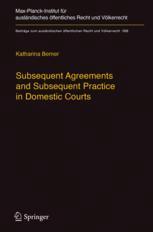

Most ebook files are in PDF format, so you can easily read them using various software such as Foxit Reader or directly on the Google Chrome browser.
Some ebook files are released by publishers in other formats such as .awz, .mobi, .epub, .fb2, etc. You may need to install specific software to read these formats on mobile/PC, such as Calibre.
Please read the tutorial at this link: https://ebookbell.com/faq
We offer FREE conversion to the popular formats you request; however, this may take some time. Therefore, right after payment, please email us, and we will try to provide the service as quickly as possible.
For some exceptional file formats or broken links (if any), please refrain from opening any disputes. Instead, email us first, and we will try to assist within a maximum of 6 hours.
EbookBell Team

0.0
0 reviewsThe book analyses how subsequent agreements and subsequent practice as defined in articles 31 and 32 of the 1969 Vienna Convention on the Law of Treaties have been applied in interpretative reality. Based on the jurisprudence of domestic courts, it elucidates the distribution of power between the parties to a treaty and other actors. To start with, the book traces the origins of subsequent agreements and subsequent practice and places them in their broader legal context. Next, it explores the legal status and effects of subsequent agreements and subsequent practice, explains why such agreements are only rarely used, and defines the relevance of non-party practice in the interpretative process. In closing, it critically examines how domestic courts have approached the normative heart of subsequent practice, i.e. the notion of ‘agreement’. Thus, this book ultimately challenges the traditional assumption that the parties are the joint masters of the treaty.